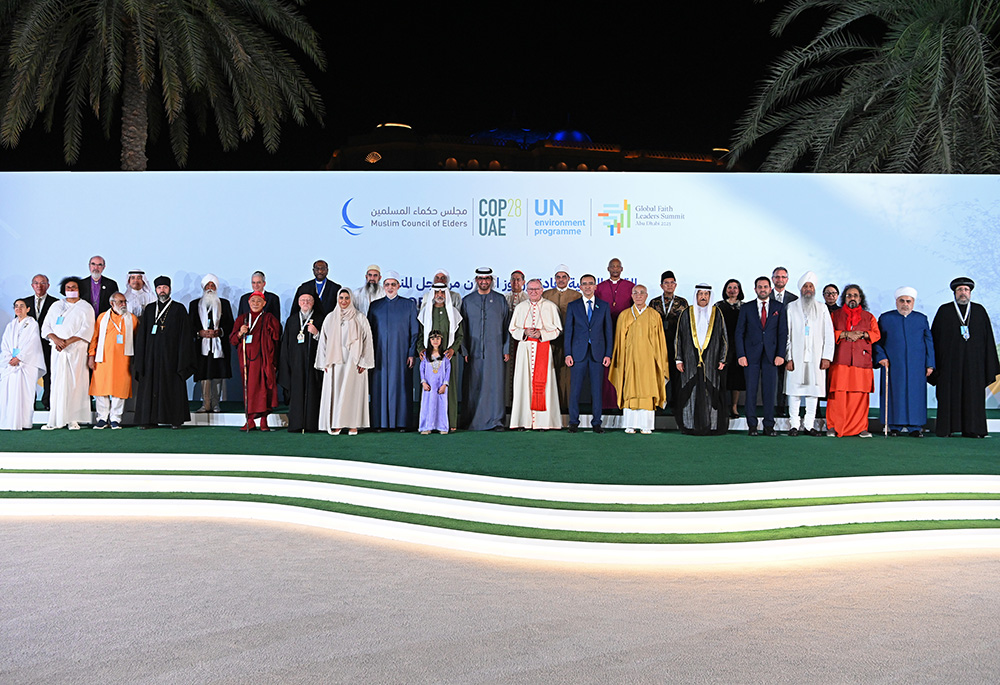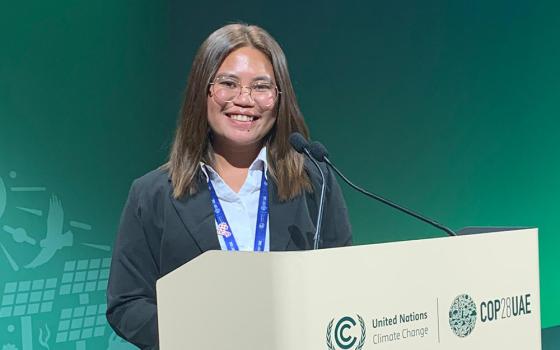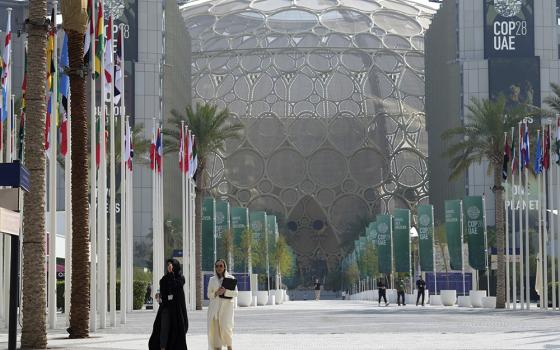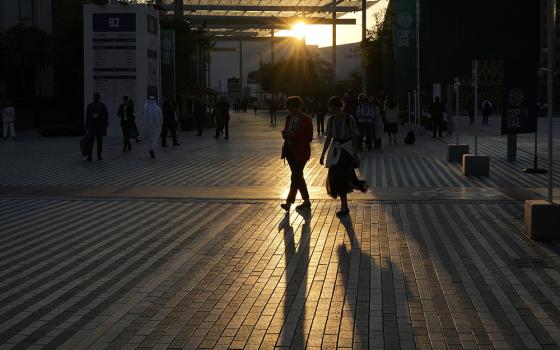
More than 200 religious leaders, academics, scientists and youth activists took part in the Global Faith Leaders Summit Nov. 6-7 in Abu Dhabi, United Arab Emirates, to deliver a united interfaith message for just and rapid action on climate change at next month's COP28 United Nations climate conference. (Courtesy of Muslim Council of Elders)
Casting this as a "pivotal moment of the global climate crisis," leaders of the world's major religions have called on governments and the business world to use the upcoming United Nations climate summit to usher in a just and rapid transition from fossil fuels to clean energy sources, and for nations to establish accountability mechanisms to hold them to their climate action pledges.
The statement from 28 high-level leaders representing 19 different faith traditions, including Vatican Secretary of State Cardinal Pietro Parolin, comes three weeks ahead of the COP28 international climate change conference, to be held in Dubai in the United Arab Emirates from Nov. 30 to Dec. 12.
The 28th climate summit, which will feature the first-ever papal visit and faith pavilion, will conclude a multiyear "global stocktake" process that is expected to show nations well off pace in meeting the goals of the 2015 Paris Agreement, including to hold average global temperature rise to 1.5 degrees Celsius (2.7 degrees Fahrenheit). Already, average world temperatures have risen about 1.1 to 1.2 C since the late 1800s and scientists say the planet is on track to eclipse 1.5 C in the 2030s. Summer 2023 was the hottest on record, and a new report found that the past 12 months were the hottest of the modern era.
Climate change is primarily driven by burning fossil fuels, and scientists have stated that each degree of warming increases climate-related risks — like floods, droughts, sea rise and extreme storms — that threaten people and ecosystems.
"As we stand at the precipice of history, considering the gravity of the challenges we collectively face, we remain mindful of the legacy we will leave for generations to come," the 28 faith leaders wrote.
"We ardently implore all decision-makers assembled at COP28 to seize this decisive moment and to act with urgency, weaving a tapestry of shared action and profound responsibility. The urgency of the hour demands that we act swiftly, collaboratively, and resolutely to heal our wounded world and preserve the splendor of our common home," the statement said.
'Our faith instills in us a sacred duty to cherish not only our human family but also the fragile ecosystem that cradles us.'
—Interfaith statement on climate action
Within the joint statement, the religious leaders said, "Our faith instills in us a sacred duty to cherish not only our human family but also the fragile ecosystem that cradles us," and reasserted that their traditions would each do their part to bring about "a paradigm shift in our relationship with Earth and all its inhabitants, fostering a profound sense of reverence and responsibility."
The interfaith statement on climate action was signed Nov. 7 at a pre-COP28 summit of faith leaders held in Abu Dhabi, UAE. More than 200 participants — an assembly of religious, academics, youth, scientists and Indigenous people — took part in the two-day gathering that was organized by the Muslim Council of Elders alongside the U.N. Environment Programme, or UNEP, and the COP28 presidency.
The gathering was the latest effort on the part of the world's religions to more resolutely engage international negotiations and decision-making on responses to climate change and biodiversity restoration. In 2016, Pope Francis hosted a similar gathering at the Vatican where a then-unprecedented interfaith climate statement was signed and delivered to leaders at the COP26 summit in Glasgow, Scotland. And last month, Francis issued Laudate Deum, an apostolic exhortation "on the climate crisis" that in part outlined expectations for COP28.
An estimated 6 billion people, or 84% of the global population, identify with a faith, religion or values system, according to Pew Research Center.
In a video message during the interfaith gathering, U.N. Secretary-General Antonio Guterres said, "We need the moral voice and spiritual authority of faith leaders globally to summon the conscience of world leaders, awaken their ambition and inspire them to do what is needed."
Signatories to the latest statement included representatives of the world's major religions — Buddhism, Christianity, Hinduism, Judaism, Islam — as well as Bahá'is, Sikhs, Mahikaris and Mandaeans. Among them were Parolin, who signed on the pope's behalf; Mohamed al-Duwaini, deputy of Al-Azhar al-Sharif, who represented Ahmed al-Tayeb, the grand imam of Cairo's Al-Azhar mosque and top cleric of Sunni Islam; Ecumenical Patriarch Bartholomew of Constantinople; Debra Boudreaux, CEO of the Buddhist Tzu Chi Foundation; and Chief Rabbi David Rosen, international president of Religions for Peace.
The document, signed on the one-month mark of war in the Holy Land between Israel and Hamas, was delivered to COP28 president-designate Sultan al-Jaber, who called it "a powerful statement of intent that the whole world needs to hear."
Expectations for ambitious outcomes from COP28 have been low among many observers, in part due to deep ties of al-Jaber and host country UAE to the oil industry, including plans to expand production even as the International Energy Association has stated no new fossil fuel development can occur if the 1.5 C target will be met.
'We need the moral voice and spiritual authority of faith leaders globally to summon the conscience of world leaders, awaken their ambition and inspire them to do what is needed.'
—U.N. Secretary-General Antonio Guterres
In a statement, Parolin said, "The scientific community has made it clear that we need an urgent change of direction. The climate crisis, which has deep ethical roots, is an alarming and clear example of a failure of conscience and responsibility," adding that "the real enemy is irresponsible behavior."
Al-Duwaini, the senior Al-Azhar official, expressed hope that COP28 "will distinguish itself from past conferences by achieving more substantial outcomes through cooperative efforts with all sectors, including faith-based communities, to become more proactive and pragmatic in addressing the impacts of climate change."
In their statement, the faith leaders outlined 13 calls to action for heads of state, governments and negotiators at COP28 to heed.
They stressed the need for "urgent responses" in the form of fast-tracked energy transitions that ensure "fairness and equity and what's morally right." They added that "no one must be left behind" in the energy transition, with special attention to centering the needs of children, communities most vulnerable to climate impacts, women, Indigenous peoples and nature.
Advertisement
They pressed for policymakers and businesses together "to adopt a rapid, just transition away from fossil fuels, embracing clean energy sources," saying countries with greater resources should lead in curbing heat-trapping greenhouse gas emissions and in supporting climate mitigation and adaptation efforts in developing countries.
The faith leaders also called on governments to establish "accountability mechanisms" that would hold them to fulfilling their climate plans (known as nationally determined contributions) under the Paris accord, which lacks enforcement and regulation measures.
In addition, they "implore[d]" that governments commit to financing the newly established "loss and damage" fund to assist communities already affected by the impacts of climate change, and for financial institutions and the private sector "to adopt responsible investments and business practices aligned with climate, environmental and social standards."
Other asks involved linking actions on climate change with biodiversity restoration efforts, to protect the planet "as a source of life," and to develop a more circular model of growth "that allows us to live a balanced and dignified life in harmony with nature."
In addition to committing to integrate ecological teachings and values within their religious, educational and cultural institutions, the faith leaders also pledged to "actively participate" in public discussions on environmental matters, including advocating for a human right to a clean, healthy and sustainable environment, and speaking up for biodiversity and wildlife conservation and the rights of Indigenous peoples.
With that, they said they will align their finances — cumulatively the world's third largest investor, controlling $5 trillion in capital, according to a study by U.K.-based FaithInvest — with an ethical standard "that supports a thriving planet and its inhabitants." The statement did not mention divestment from fossil fuels, of which faith-based organizations represent the largest share (36%) of the nearly 1,600 divesting institutions worldwide.
The religious leaders added that they will "lead the pursuit and reimagining of sustainable lower carbon lifestyles" that respect the Earth's resources and change consumption patterns., a
At COP28, the first-ever faith pavilion will host more than 60 events. It intends to serve as a space for religious leaders to dialogue with political leaders, the business community and youth activists in an effort to scale up climate action across society, said Mohamed Abdelsalam, secretary-general of the Muslim Council of Elders that is hosting the space.
Grandmother Mona Polacca, an Indigenous leader from the Colorado River Indian Tribe, in a statement referred to COP28 as "a historic opportunity for us religious and spiritual leaders to do as the great Indigenous Lakota Chief Sitting Bull said in his infinite wisdom, 'Let us put our hearts, minds, and spirit together to see what life we will give to our children.' "







